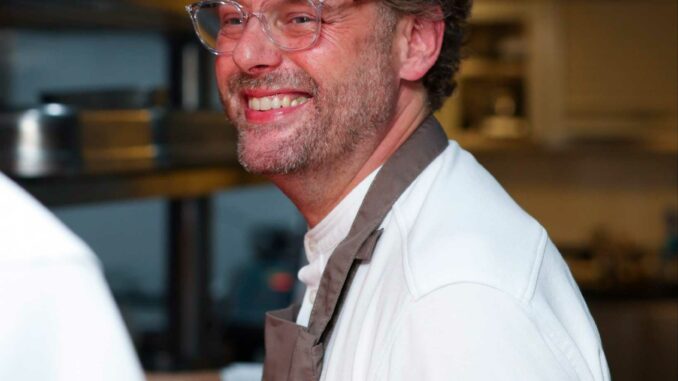
La Vague d’Or at Cheval Blanc St-Tropez is a three-Michelin-star destination where Arnaud Donckele crafts poetic Provençal cuisine driven by sauces, terroir and precision.
La Vague d’Or, the gastronomic flagship of Cheval Blanc St-Tropez, is one of those rare dining rooms where dinner feels like a story told in chapters. At the helm is Arnaud Donckele, among France’s most decorated chefs, whose cooking marries emotional memory with exacting technique. Across the terrace, the Gulf of Saint-Tropez glows; on the plate, the French gastronomy of Provence is distilled into lucid flavors and intricate, sauce-led compositions. This is a restaurant with a reputation forged over time: three Michelin stars, a top Gault&Millau rating, and a chef who also directs another three-star kitchen in Paris. For travelers seeking a destination fine dining experience—one that is intimate, rigorous and distinctly Mediterranean—La Vague d’Or repays the journey.
The chef: vision and background
Origins and education
Rouen-born, Arnaud Donckele grew up close to the craft of food: his parents were charcutiers-traiteurs and his grandparents farmed in northern France. He trained at École Ferrandi before moving through some of the country’s great kitchens, apprenticing with Michel Guérard at Les Prés d’Eugénie and working with Alain Ducasse at Le Louis XV in Monaco and at Lasserre and Plaza Athénée in Paris. Those formative years honed an artisan’s discipline—classical stocks, jus and emulsions—and a sensitivity to product. Donckele arrived in Saint-Tropez in the mid-2000s, assuming the leadership of the restaurant that would become La Vague d’Or. Provence soon anchored his identity: fishermen, gardeners and foragers shaped his thinking as much as any mentor, and the Riviera’s light and produce gave him a narrative he could make his own.
Culinary philosophy and style
Donckele’s cuisine is unmistakably modern French yet rooted in tradition—an ode to sauces, broths and infusions. He describes himself, half-jokingly, as a “saucier of emotions.” Dishes begin with an idea—often a memory or a product meeting—and are built around a liquid framework: a velouté steeped with wild herbs, a vinaigrette of shellfish juices, a bouillon that reads like Provençal landscape in liquid form. Textures are precise, temperatures exact, flavors civil yet intense. The wider pantry is local: line-caught Mediterranean fish, sun-matured vegetables, mountain herbs, olive oils and citrus. Seasonality is non-negotiable. The result is a cuisine of clarity: indulgent but never heavy, generous but ordered, poetic without losing bite. This is modern French cuisine where the sauce is not an accessory but the backbone.
Awards and recognition
La Vague d’Or has held three Michelin stars since 2013 and a Gault&Millau score of 19/20 with five toques—distinctions that place it at the summit of Michelin-starred dining in France. Donckele himself has been named Cook of the Year by Gault&Millau and is widely cited for his mastery of sauces. In 2022, he opened Plénitude at Cheval Blanc Paris; it received three Michelin stars within months and later earned the World’s 50 Best Art of Hospitality Award, underscoring the chef’s holistic approach to the dining journey. Select collaborations, such as long-term work with a major Champagne house, reflect his interest in dialogue between liquid and solid, cellar and kitchen.
Broader influence
Beyond Saint-Tropez, Donckele oversees multiple projects within the Cheval Blanc universe and is a visible advocate for artisan producers and sustainable sourcing. He champions small fishing boats, garden growers and heritage millers, and he is known for forming enduring ties with suppliers—relationships that allow him to specify varieties, maturations and cuts with unusual granularity. His kitchens are also finishing schools for young cooks. Graduates leave fluent in the grammar of stocks and sauces, respectful of seasonality, and comfortable working closely with front of house—an ethos that feeds back into the region’s culinary ecosystem.
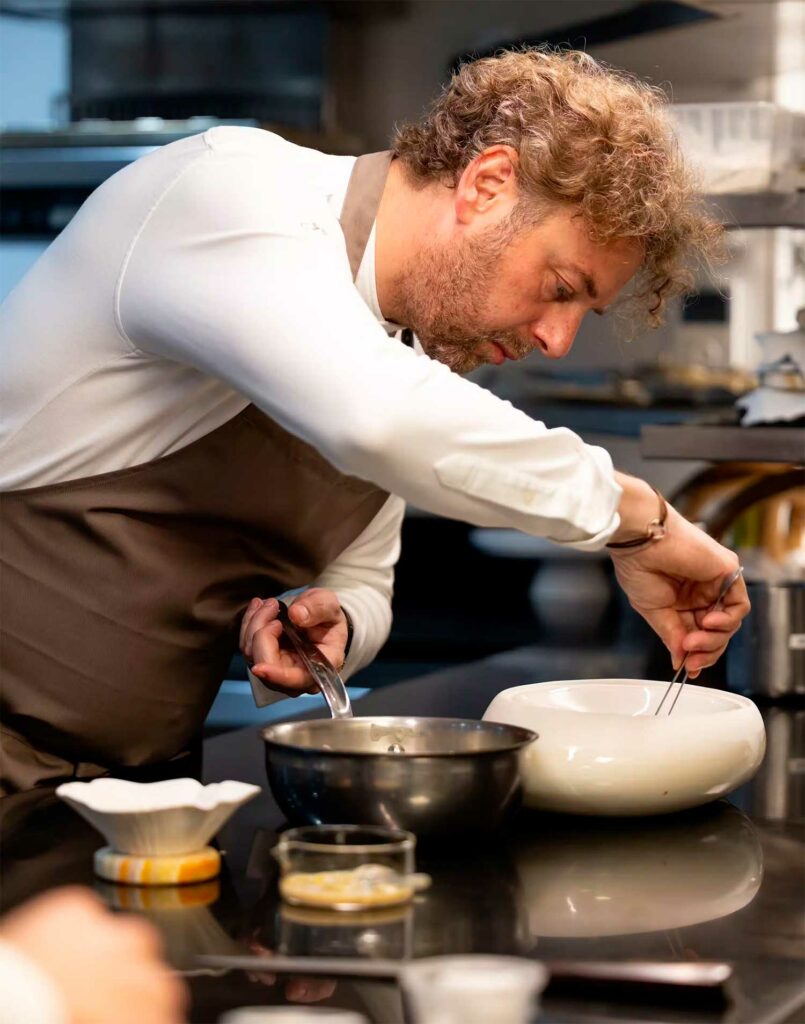
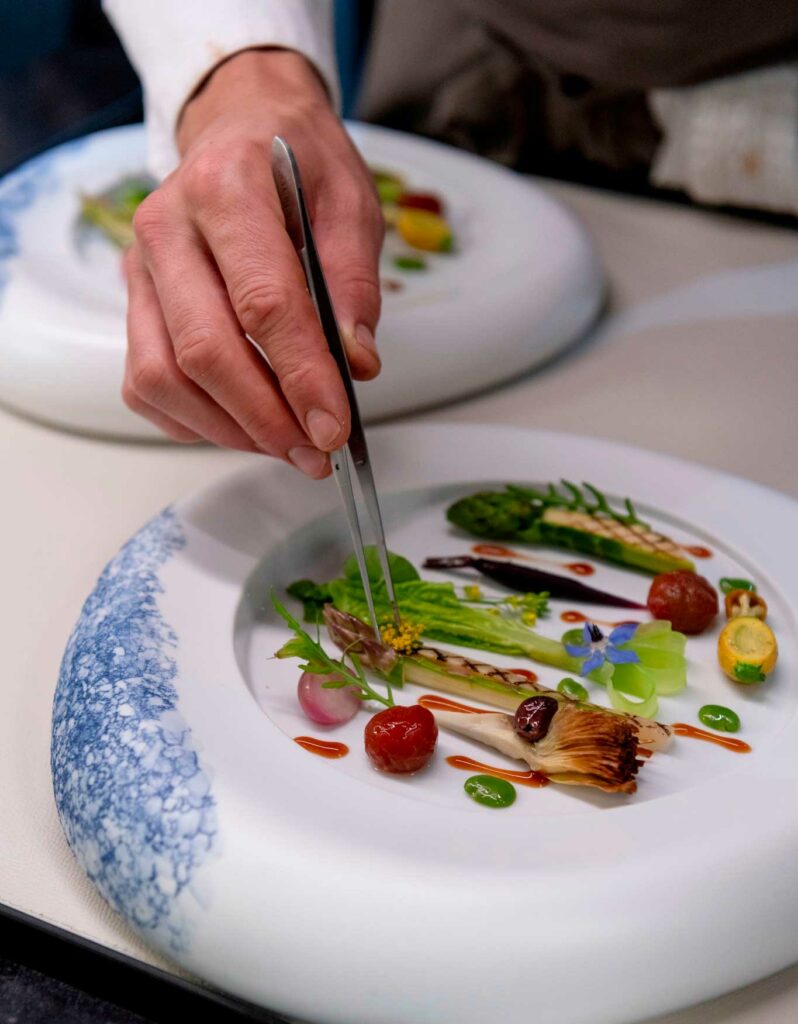
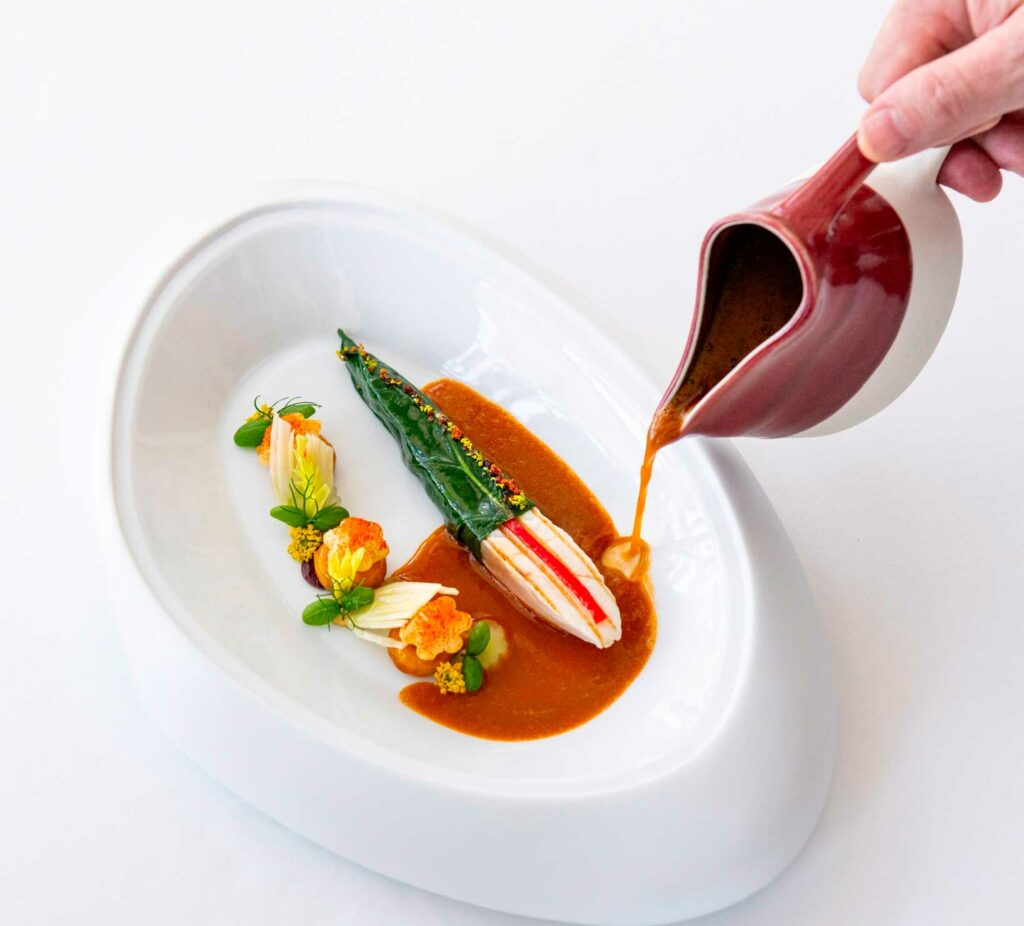
The restaurant: concept and experience
Location and atmosphere
La Vague d’Or sits steps from the water at Cheval Blanc St-Tropez, on Plage de la Bouillabaisse. Approached through umbrella pines, the dining room extends to a terrace that frames the bay and citadel. The décor is Riviera elegant: pale woods, sun-bleached tones, ceramics and glassware crafted to the chef’s specifications. Service is choreographed but warm—never theatrical for its own sake—allowing the room to breathe. In season, the restaurant opens for dinner; sunset becomes part of the mise en scène, and the rhythm of the meal mirrors the fading light.
Cuisine and signature dishes
Menus are seasonal and theme-driven. Guests often choose between a narrative tasting and an “epicurean stroll,” but the core vocabulary is consistent: Mediterranean fish and crustaceans researched to the point of obsession; Provençal vegetables treated with the seriousness of prime protein; meats and game served in counterpoint to the sea.
Signatures evolve, but certain ideas recur. A study of local fish might present multiple extractions—bone roasts yielding a translucent jus, collagen-rich reductions glazed with citrus oils, a shellfish vinaigrette layered at the table. Turbot baked in salt with seaweed and citrus peel shows Donckele’s restraint: a luxurious fish, cooked with monastic precision, brightened by a sauce that reads like a bottled shoreline. Young rabbit scented with absinthe and country bacon nods to inland Provence, while seasonal vegetables arrive in edible gardens, their sapidity lifted by herb broths and light sabayons. Desserts preserve the logic of the savory courses: structure, perfume, temperature. A rose-shaped apple tart or citrus compositions may close the arc with finesse.
Wine pairings are serious without being doctrinaire. Expect rare Provence whites, mature Rhône bottles, Burgundy benchmarks and thoughtful foreign incursions, all curated with the Maison’s sommelier team. The cellar leans deep on French classics yet remains curious, which suits a cuisine of nuance over shock.
The dining experience
Dinner at La Vague d’Or is paced as a conversation. It opens gently—broths and amuse-bouches building a lexicon of local herbs and shellfish—before moving to bolder infusions and quietly luxurious products. Sauces are introduced and explained: the team wants you to taste intention as much as technique. Portions are balanced; even the grandest courses preserve appetite. Expect linen-fine service, precise dishware, measured music and an absence of clutter. While prices reflect the restaurant’s status and sourcing, the value lies in coherence: sourcing, cooking, pairing and service align to tell one story. For seekers of culinary experience in France at the highest level, this is a benchmark for how Riviera luxury can feel both intimate and exact.
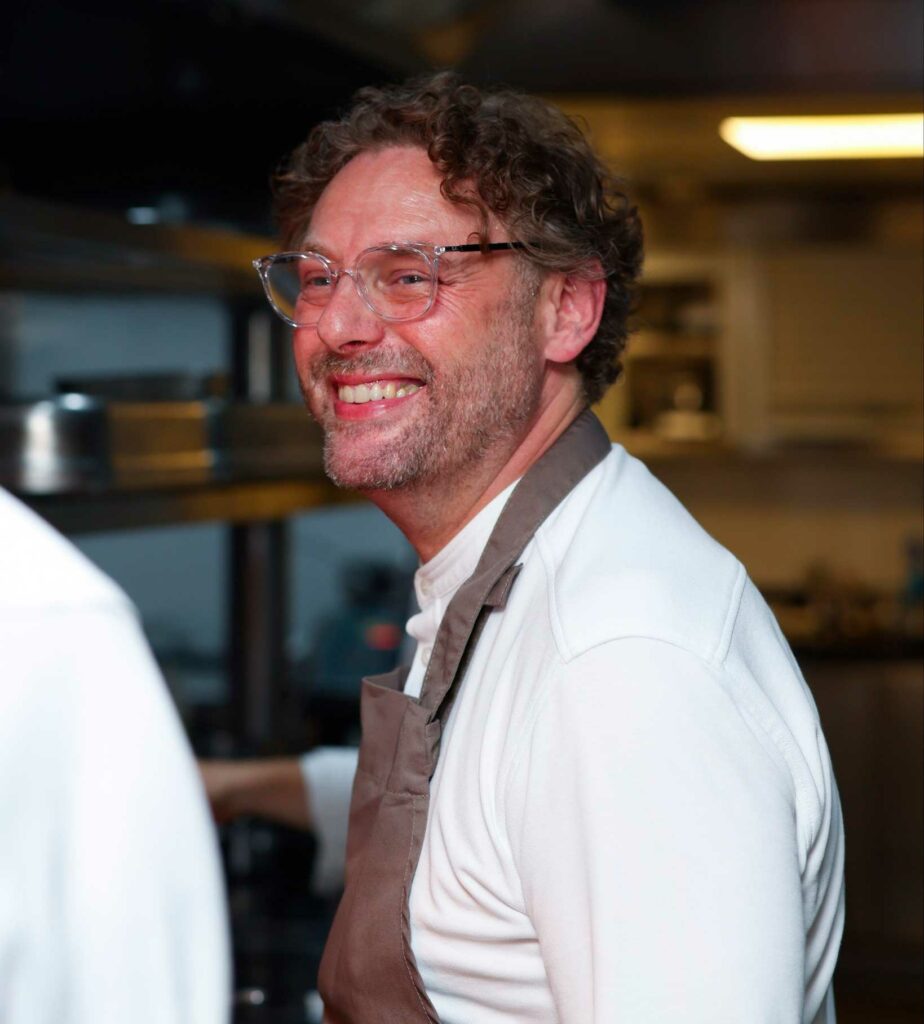
Awards, sustainability, and other highlights
La Vague d’Or’s distinction—three stars from the Michelin Guide and the top band of Gault&Millau—speaks to consistency across seasons. Press acclaim routinely underlines the same strengths: narrative menus, sauces as protagonists, a rare sensitivity to Mediterranean fish, and service that is polished without stiffness. Within the broader Cheval Blanc group, attention to sourcing is a point of pride. The kitchen’s network of small producers, long-standing ties with fishers and gardeners, and disciplined seasonality amount to quiet sustainability: buying less, better, closer. In parallel, the Maison’s beverage teams pursue relationships with winemakers whose farming is thoughtful and whose styles complement the cuisine’s precision. Collaborative projects—especially with champagne houses—extend the conversation beyond the plate, aligning bubbles and broths, chalk and citrus with the chef’s infusions.
A Riviera essential, rendered with grace
What sets La Vague d’Or apart is not just artistry; it is authorship. Donckele writes Provence in a chef’s hand—the perfumes of garrigue, the iodine of the Gulf, the chiaroscuro of pine and sun—then binds it with the old grammar of French sauces. The result is deeply contemporary fine dining because it is deeply specific: to this shoreline, this season, this team. For travelers planning cooking holidays or a once-in-a-lifetime splurge, there are few tables where the promise of learn French cuisine—not in a classroom but through tasting—feels so complete. Book for the views; return for the way a single spoon of broth can hold a landscape. In a crowded Riviera, La Vague d’Or remains a destination where luxury whispers and flavors speak clearly.
Cook in France is your independant source for food in France.